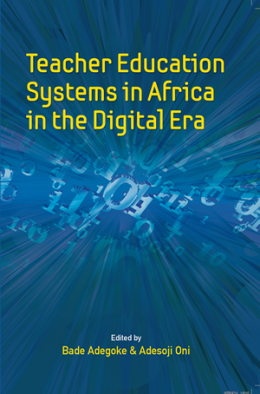Teacher Education Systems in Africa in the Digital Era
Keywords:
Education, Digital Era, technological manpower, ICT, NigeriaSynopsis
Teacher education is vital for the realization of a nation’s development aspirations. The conception, incubation and delivery of any national development policy, as well as the reform and implementation of extant policies, are driven by the quality of teachers and their products within a functional educational system. Indeed, national and global models of development, including the millennium development goals revolve round the frames of quality education, beginning with teacher education. It is therefore important to have functional teacher education systems in Africa to help its citizens explore the networking of the world as a global village. This is achievable through a systematic mobilization of national resources and visible commitment to the development of a modernized cadre of scientific and technological manpower. This book, Teacher Education Systems in Africa in the Digital Era is a rich exposition of theories and praxes essential for the development of teacher education in Africa. The book has immense benefits for teachers, teacher trainers, funding agencies, other stakeholders and policy makers.
Chapters
-
Introduction
-
Re-profiling the Teacher and Teacher Educators
-
Policy Issues in Teacher Education
-
Mapping Teacher Education Institutions for Excellence
-
Teacher Education in Open and Distance Learning Universities in Africa
-
Teacher Education in South Africa: Issues and Challenges
-
The Delivery System in Teacher Education
-
The Delivery System in Teacher Education in Nigeria: Traditional Practices and New Paradigms
-
Sociological Perspectives of Skills Development in Teacher Education
-
Counselling Perspective for Skills Development in Teacher Education
-
ICT and Teacher Education in East Africa
-
Integrating Technology into Social Science Teacher Education in Nigeria
-
Pedagogical Integration of Technology into Science, Technical and Vocational Education
-
Teacher Education and Process Skills Enhancement in the Science Technology Society Classroom
-
Obstacles to the Domestication of ICT in Humanities Education in Nigeria
-
Curriculum Theorizing and Practice in Teacher Education
-
Entrepreneurship in Teacher Education: Issues, Trends and Prospects
-
Integrated Pedagogical Approaches for a Productive Teacher Education
-
Strategic Planning for Quality Teacher Education
Downloads
References
Akudolu, L.R., 2004, Teaching the Language Arts, Enugu: John Jacobs’ Publishing, pp. 12-18.
Akudolu, L.R.I., 2004, ‘Comparative Analysis of the Effects of Computer-assisted Language Learning (CALL) and Conventional French Instruction (CFI) on Students’ Performance in French Language’, International Journal on Information and Communication Technology (December 2004), Volume 1, No.1 and 2, pp. 33-41.
Adomi, E.E., 2005, ‘InternetDevelopment and Connectivity in Nigeria’, Retrieved on 28/01/2009from:http://www.emeraldinsight.com/Insight/ViewContentServlet?Filename=Published/EmeraldFullTextArticle/Articles/2800390306.html
Alampay, E.A., 2006, ‘Beyond Aaccess to ICTs: Measuring Capabilities in the Information Society’, International Journal of Education and Development Using Information and Communication Technology, Vol. 2, Issue 3, pp. 4-22.
Appoh, J., 2007, ‘Integrating Technology into the Process of Teaching and Learning’, Journal of Research and Development in Education (JORDE) 7, pp. 129-135.
Badmos, A.M., 2004, ‘Computer Instruction: An Approach that Expedites the System of Education’, Nigeria Journal of Computer Literacy, Vol. 5, no. 1, pp. 21-29.
Bates, T., 2001, National Strategies for e-Learning in Post-secondary Education and Training,Paris: UNESCO, pp. 1-15.
Baylor, A. and Ritche, D., 2002, ‘What Factors Facilitate Teacher Skill, Teacher Morale and Perceived Student Learning in Technology Using Classrooms?’, Computers & Education, Vol. 39, No. 1, pp. 395-414.
Busari, T.O., 2006, ‘Information and Communication Technology in Science and Technology Education’, in V.B. Owhotu, ed., An Introduction to Information Technologies in Education, Lagos: Sibon Publishers, pp. 101-103.
Chigona, A., Chigona, W. and Davis, Z., 2010, ‘Motivating Factors: Educators’ Use of ICT in Schools in Disadvantaged Areas in the Western Cape’, International Conference on Information Management and Evaluation, University of Cape Town, Cape Town.
Collins, B., 2002, ‘Information Technologies for Education and Training’, in H. Adelsberger, B. Collis, and J. Pawlowski, eds., Handbook on Technologies for Information and Training, Berlin: Springer Verlag, pp. 32-33.
Czerniewicz, L. and Brown, C., 2009, ‘A Study of the Relationship between Institutional Policy, Organizational Culture and e-Learning Use in Four South African Universities’, Computers & Education, 53(1), pp. 121-131.
Deniz, L., 2007, ‘Prospective Class Teachers’ Computer Experience and Computer Attitudes’, International Journal of Social Sciences, Vol. 2, no. 2, pp. 116-122.
Eastman, J., 2007, ‘Enhancing Classroom Communication with Interactive Technology: How Faculty Can Get Started’, Journal of College Teaching Methods &Styles, Vol. 3, no. 1,pp. 31-37.
Frissen, V.A.J., 2000, ‘ICTs in the Rush Hour of Life’, The Information Society, 16, pp. 65-75.
Fullan, M., 1992, Successful School Improvement: The Implementation Perspective and Beyond, Philadelphia, USA: Open University Press, pp. 21-30.
Ikoro, F.M., 2002, ‘Information Sources for Effective Teaching and Learning in Nigerian Languages’, Language Librarianship 1(2), pp. 21-29.
Ajayi, T.E., 2005, ‘An Overview of Strategic Planning Process: Implications for Planning in the Ministries of Education’, in R.A., Alani, ed., Managing the Education System: A Book in Honour of Professor O.E.M. Fagbamiye, Ibadan: Triumph-Providential Publishers, pp. 38-46.
University of Lagos, Strategic Plan (2005 – 2009), Lagos: University of Lagos Press. http://en.wikipedia.org/wiki/PEST_analysis
http://www.cipd.co.uk/subjects/corpstrtgy/general/swot-analysis.htm






